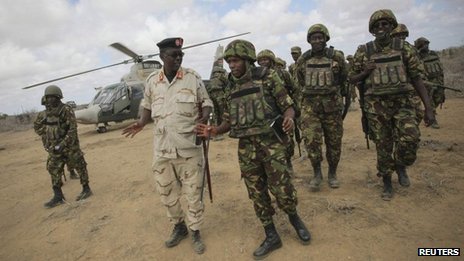The first Somali government and African Union (AU) troops are reported to have entered the strategic Somali port of Kismayo, witnesses and officials say.
They have been battling the al-Shabab militia for control of the city.
On Saturday, the al-Qaeda-aligned militants said they had withdrawn from Kismayo after an AU military assault.
Kenyan and Somali forces had launched a beach assault on the Islamist group’s last major bastion the day before, but had met some resistance.
Reports as to the size and make-up of the AU contingent have been mixed.
One resident said Somali Service that a small infantry unit of 11 Somali soldiers had entered the city from the west and were patrolling on foot on the main roads of Kismayo, while another said he had seen both Kenyan and Somali troops entering the city centre from the airport.
Around 100 troops were seen by a tribal elder in Kismayo taking over a police station and setting up an outpost on top of a tall building.
Somali government spokesman in Kismayo Mohamed Faarah Daher said AU and Somali forces had gone in to the city to establish security for the population, and had also taken up positions at the airport and sea port.
Kenyan troops are part of an African force trying to wrest control of Somalia from militants for the new United Nations-backed president.
After resisting the AU and Somali advance on Friday, al-Shabab announced it had shut its five-year administration in Kismayo the next day for strategic reasons.
Residents had spoken of increasing tension inside the port town amid the power vacuum that ensued.
A number of influential clan figures have been murdered in the past few days.
The Kenyan military said that Kenyan, Somali and AU troops were “currently consolidating the gains in Kismayo and expanding out to the rest of the city”, according to a message on its official Twitter account.
Kenyan soldiers have “established no-fire zones around markets, schools, mosques and hospitals”, another message read. Kenyan troops are reported to be present in Kismayo’s suburbs but not in the city centre.
The Kenyan Deputy Prime Minister Musalia Mudavadi said Kenya welcomed the move on Kismayo.
“Kenya has been bearing the brunt of the instability in Somalia for a very long time. We host 650,000 refugees and we have been seeing sporadic incidents of grenade attacks in Kenya,” he said.
“So any action supported by the international community… is very positive because it is going to give room for Somalia to stabilize,” he added.
Last week, a Kenya military spokesperson said he feared the withdrawal might be a trap, making the army wary of entering Kismayo. There have been unconfirmed reports that al-Shabab may have mined parts of the town.
Correspondents say the loss of Kismayo will be a major blow to the Islamists.
Somalia’s second largest port is a significant source of revenue for whoever controls it and al-Shabab also used the port to bring in weapons.
AU troops pushed al-Shabab from the Somali capital, Mogadishu, in August 2011.
Along with other pro-government forces they have gone on to take control of most of the major towns previously in the hands of the militants.
But the al-Qaeda-linked group’s fighters are still highly active in much of the countryside in southern and central Somalia and have carried out attacks in cities they no longer control.
Since the overthrow of President Siad Barre in 1991, Somalia has seen clan-based warlords, Islamist militants and its neighbors all battling for control.
[youtube _qJAFuK-o0k]
